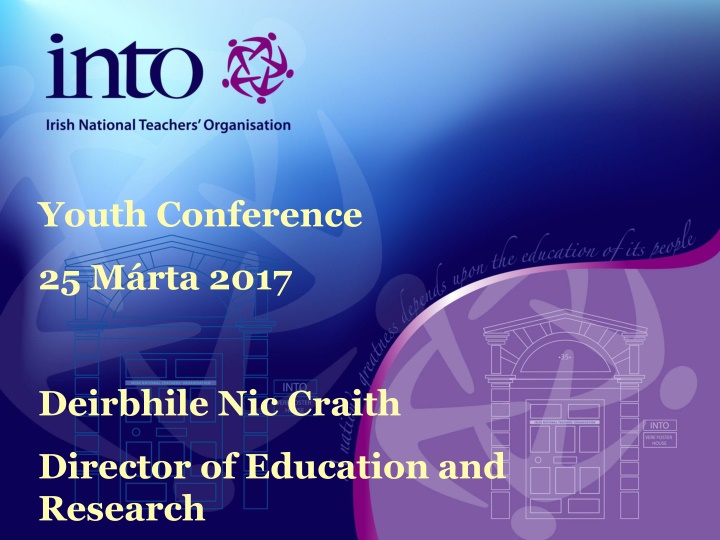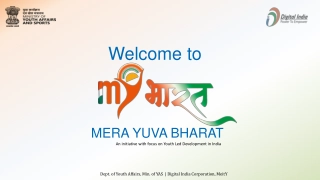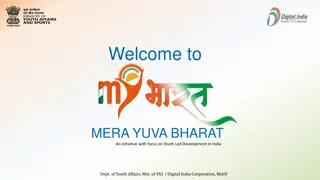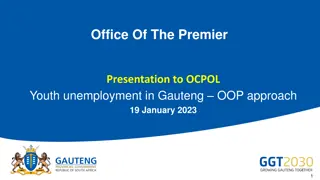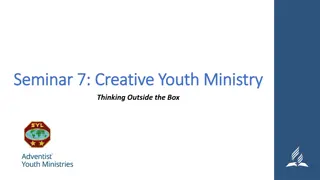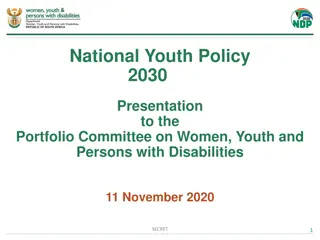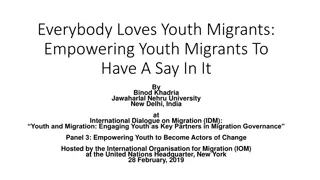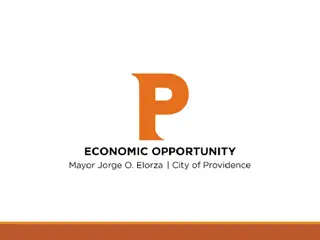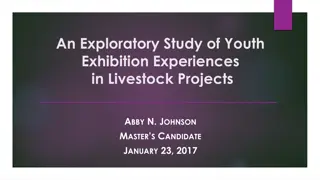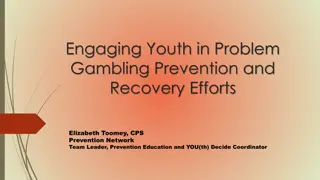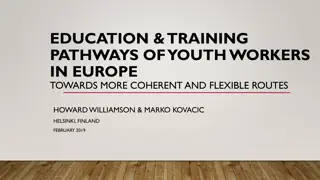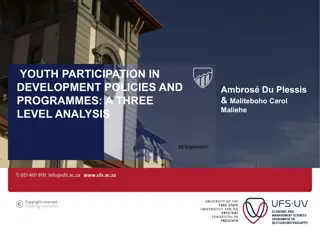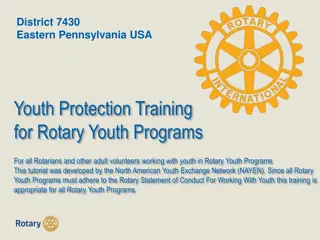Youth Conference - Vision for Education Development
Director of Education and Research leading the Youth Conference discusses topics like school governance, curriculum, and teacher education. Emphasizes the importance of teachers in policy debates and outlines the vision for education development. The approach includes representation, consultations, conferences, publications, and research to shape educational policies and anticipate emerging trends, responding to both national and international research in education. Consultation meetings are scheduled to discuss primary language curriculum, literacy, numeracy, and special education topics with various districts.
Download Presentation

Please find below an Image/Link to download the presentation.
The content on the website is provided AS IS for your information and personal use only. It may not be sold, licensed, or shared on other websites without obtaining consent from the author.If you encounter any issues during the download, it is possible that the publisher has removed the file from their server.
You are allowed to download the files provided on this website for personal or commercial use, subject to the condition that they are used lawfully. All files are the property of their respective owners.
The content on the website is provided AS IS for your information and personal use only. It may not be sold, licensed, or shared on other websites without obtaining consent from the author.
E N D
Presentation Transcript
Youth Conference 25 M rta 2017 Deirbhile Nic Craith Director of Education and Research
School Governance Curriculum & Assessment Teacher Education Education School Induction Social Inclusion Special Education / Inclusion Early Childhood Education
Teachers should be at the heart of policy debate. (Policy Research in Educational Settings: contested Terrain, Jenny Ozga, 2000)
Vision for Education in INTO To be the leading voice in education policy development To anticipate and be prepared for emerging trends in education To determine and lead major movements / trends in education To be to the fore in progressing education issues To respond to both national and international research To be aware of broader developments in Education
How do we do this? Representation Consultations Conferences Publications Research
Representation National Council for Curriculum and Assessment (NCCA) Teaching Council An Chomhairle um Oideachas Gaeltachta & Gaelscola ochta (COGG) National Consultative Forum on Special Education
Consultations Recent Topics Primary Language Curriculum Literacy and Numeracy Strategy New Allocation Model for Special Education Current Consultation Structure of Primary Curriculum and Time Allocation across the Curriculum Process Questionnaires Consultation Discussions within Districts Email
Consultation Meetings District Consultation Meetings on Curriculum Time and Structure DATE DISTRICT VENUE TIME Tuesday 14 March 14/15 Regency Hotel 4.00pm Monday 20 March 8 The Union Caf (formerly Kielys), Dublin 4 3.45pm Wednesday 22 March 13 Kilmurry Lodge, Castletroy, Limerick 7.00pm Monday 27 March 12 Oriel House Hotel, Ballincollig 7.00pm Tuesday 28 March 16 Clayton Hotel Silver Springs, Cork 6.30pm Tuesday 28 March 7 Mullingar Park Hotel 7.00pm Wednesday 29 March 4 Twin Tree Hotel, Ballina, Co. Mayo 7.00pm Monday 3 April 5 Glencarn Hotel, Castleblayney 7.00pm Monday 3 April 13 Dromhall Hotel, Killarney 7.00pm Monday 3 April 11 Clonmel Park Hotel 4.30pm Tuesday 4 April 10 Talbot Hotel, Carlow 5.30pm Saturday 8 April West Clayton Hotel, Galway 10.00am
Conferences Annual Consultative Conference on Education Biennial consultative Conference on Special Education Biennial Consultative Conference for Principals and Deputies Triennial Consultative Conference on Equality National Youth Conference Occasional Conferences / Seminars DEIS School Placement
Research Background papers for conferences Collaborative projects Teachers Experience of Standardised Testing in Primary Schools INTO and CARPE (Centre for Assessment Research Policy and Practice in Education) INTO Bursary for Educational Research The voice of Teachers Questionnaires / Surveys Focus Groups
Publications Intouch Irish Teachers Journal Proceedings of Conferences Submissions
Professional Development Summer Programme Online Courses Facilitation Skills Seminar to support consultations
Members (40,423) Education Committee Branches(180) Equality Committee Districts (16) Principals and Deputy Principals Committee Central Executive Committee (22) 16 elected representatives, President, Vice-President, Ex-President, General Secretary, General Treasurer and Northern Secretary Northern Committee Congress Accounts Committee, Standing Orders, Benefit Funds Committee
Education Committee Sixteen elected members Three-year term Supported by Officials Deirbhile Nic Craith and Nuala O Donnell Current Issues in Education Consultative Conference on Education Consultations with members Research questionnaires and focus groups
Current Issues in Education Curriculum and Assessment Revision of Primary School Curriculum Language Curriculum Mathematics Literacy & Numeracy Strategy Early Childhood Education Teacher Education ITE, Induction, CPD School and Teacher Evaluation
Consultative Conference on Education Teaching in the 21st Century 2009 The Arts in Primary Education 2010 Learning Communities 2011 Literacy 2012 Wellbeing 2013 Numeracy 2014 Quality in Education Teacher Responsibility and Accountability 2015 The Primary School Curriculum 2016 100 Years of Teaching 1916-2016
Activist professionalism Activist teacher professionalism is not for the faint-hearted. It requires risk-taking and working collectively and tactically with others the activist teacher professional creates new spaces for action and debate, and in so doing improves the learning opportunities for all of those who are recipients or providers of education (Judyth Sachs, 2003, p. 153)
The involvement and commitment of teachers, with a sense of ownership and responsibility for decision-making, is an essential element for innovation (Brown et al, 1995, p.10) Policy research (especially policy research) is a fundamental right of and responsibility for teachers (p. 36)
Context of Practice Context of Text Context of Influence (Bowe, Ball, with Gold 1992)
